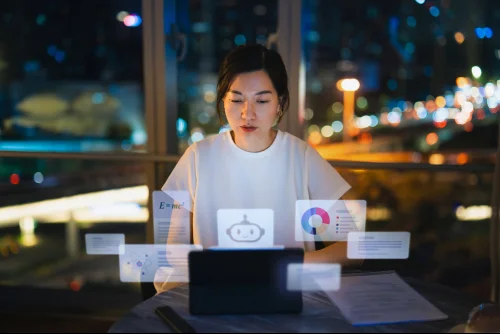Artificial intelligence expert on the common myths surrounding AI
As published in

Artificial intelligence continues to be a hot topic in business, with many organizations turning to AI experts to guide them through emerging technologies. One such expert is Alex Goryachev, who sat down with us recently to discuss how human resources can leverage artificial intelligence and the benefits of AI for business growth.

Which parts of a business will be most affected by AI?
That’s a great question. It’s really about human resources. When we think about AI, it is all about technology. However, everything about AI is about transforming businesses, so it’s something that spans every single organization. I believe over the next several years, it will affect HR the most, from recruiting to learning and development, and training people with the right skills.
“When I think about AI, our organizations are going to be changed dramatically, and there will be a significant restructure. There will be a significant attrition, so we would have to change the way our organizations are structured, very quickly. So, learning and development, training, onboarding, policy compliance, and then we talk about those digital humans that are going to be entering our workforce.
“I’m kind of sceptical about the term; I think it’s a bit of an oxymoron. Having said that, we will be augmented, or we will be augmenting, hopefully not being replaced by our digital co-workers. It’s a fact and it’s already happening, and that will end up in HR as well. So, from policy to compliance to training, to setting up this brave new world of AI-enabled businesses that is forefront to the strategy planning and HR operations.
“I love to get HR people excited about AI. I think they’re the ones that unlock the innovation in the enterprise. It’s about talent, and AI is about unlocking in that talent and unlocking the institutional knowledge.”
What are the benefits of AI for business growth?
“Where do I begin, really? The benefits are limitless, as are the opportunities and risks, however, you’ve asked about the benefits. It’s really getting things done faster, cheaper, with more efficiency. I’m not talking about laying people off and replacing them with machines; I’m talking about the ability to actually scale the operations and do more with less.
“When we have people working in our organizations, we’re able to deliver more things easier. So, that’s really about the bottom line. Then the top line is we’re able to deliver things faster and better, we can get stuff to market faster. We can interact with our customers faster. We can bring the products to market faster. There are definitely benefits, whether that’s cost avoidance or growth or efficiency.
“I think the biggest benefit of AI is staying in business, right? It’s like, what’s the benefit of electricity? There are so many benefits to electricity, from heating to cooling to just making the world run. I feel like AI is kind of the same thing. It will become the central thing that runs our organizations and that’s deeply embedded in our lives. So, it will power everything, and not doing it, not tapping into this benefit, will ultimately put us out of business.
“That’s what I really want to talk about. I really want to prepare organizations to understand what the benefits are of doing AI and working with AI and what are the risks of not doing it.”
Looking to the future of work, how will AI continue to transform the workplace?
“When we think about that transformation, it’s more of a revolution. I think AI will drastically reshape the workforce in the next year or two. Already looking at the latest data, probably 20% of the workforce is at risk, primarily in the white-collar jobs. According to the recent IBM study, around 40% of the global workforce – again, 40% – needs to be retrained.
“So, when we think about the workforce, I think the biggest thing is they will be augmented by digital humans. We will have our digital co-workers working alongside us, doing some of our tasks, and interacting with us and customers. When I think about workforce planning, getting those skills, understanding the new organizational structure, and preparing for that transition, I feel that’s the most critical and important thing.
“Again, I can’t underestimate how critical it is to understand the AI transformation that’s coming. It will change the workforce; it will change the organizational structure in an immense way. There will be an emergence of organizations that are AI natives, where AI is at the center of their company or business or enterprise. It’s essential for us to go and understand the environment, understand the opportunity, understand the challenges so that we can not only thrive, but we can actually survive this.”
What are some common myths about AI that you hope to disprove?
“Transformation, well, I think the pendulum swings from one extreme to another. One extreme is that AI can solve everything – that’s far from the truth. The other one is that AI is an overhyped thing. I think that’s far from reality.
“My goal is really to make sure that the audiences understand what AI is and isn’t and they understand how to pragmatically use AI to enhance their personal careers and enhance their organizational capabilities. So, the truth is somewhere in the middle.
“In my opinion, it’s not an answer to everything. If I look at the printing press and electricity and the internet combined, AI is way bigger than that. That’s not a myth. I think we will continue to see that as an emerging reality. My goal is to ensure audiences take advantage of that and that they’re not on the sidelines, they’re not replaced by AI, but rather, they’re the ones that are shaping the AI revolution.”

What Alex Can Do For You
Developed and led AI and Innovation strategy for multiple Fortune 100 companies, driving double-digit revenue growth.
Over 20 years of hands-on experience driving transformative business and technology solutions for global brands like Dell, Amgen, IBM, Pfizer, and Cisco.
Recognized by Forbes as “One of the World’s Top Experts on Innovation” and named a “Top AI Keynote Speaker to Watch.”
Frequent contributor to Forbes, Entrepreneur, and Fast Company, sharing actionable insights on AI strategy, the future of work, and innovation.
What sets Alex apart from other top AI speakers and innovation experts?
With AI and innovation elevated to buzzwords, there are plenty of speakers in this space. While many offer insightful keynotes, few can bring the depth of understanding, hands-on experience, and diverse viewpoints that Alex can. Alex doesn’t just talk about AI and innovation. He’s led it at Dell, Pfizer, and Cisco. He’s sat across from C-Suite execs to build global innovation plans. And he’s resonated with audiences at Google, AWS, Disney, Coca Cola, and dozens of other companies with keynotes tailored to their unique AI opportunities. A frequent contributor to Forbes, Inc., Entrepreneur, and Fast Company, Alex has been identified as a Top AI Voice on LinkedIn. He is also the author of a Wall Street Journal Bestseller, Fearless Innovation. Alex’s style is personable, approachable, and human. It’s never caught up in techspeak, or jargon so he resonates with any audience. Learn more about what sets Alex apart. Get in touch.
How does Alex customize keynotes and workshops?
No two organizations’ AI or innovation opportunities, or challenges, are the same. So canned keynotes or one-size-fits-all workshops just won’t do. Instead, Alex uses AI and data to tailor his engagements with available pre-event surveys. Analyzing responses, Alex customizes his content to address key needs and pain points, ensuring his message is meaningful. Speaking with leadership and other event stakeholders, Alex further customizes the content to ensure resonance and relevance, engaging audiences. Add it all up and you have keynotes and workshops that feel like they’ve been created for you—because they were. Learn more about Alex’s methodology. Get in touch.
What events and audiences are right for Alex?
With so much experience leading large-scale innovation initiatives, Alex is able to reach and resonate with any audience, no matter their knowledge level, industry, culture, or department. Captivating audiences from a live stage, or a virtual event, Alex is a fixture at C-Suite summits, innovation conferences, policy talks, offsites, and employee all hands meetings, plus governmental and academia events. An audience looking for fresh perspectives, real solutions, and custom content will find Alex’s keynotes engaging and actionable with ideas they can start applying right away. Curious about Alex’s recommendations for your event? Get in touch.
What companies and organizations have worked with Alex?
Alex’s roster of past clients, keynote engagements, and employers reads like a Wikipedia entry of the world’s most innovative, respected organizations. Disney, Coca Cola, ISO, AWS, Google, LEGO, CAT, IBM, Cisco, Dell, and dozens of other organizations have benefited from Alex’s keynotes, workshops, and strategic advisory services. As the former Managing Director of Innovation Strategy at Cisco, leader of global Innovation Centers and Smart City programs in 7 countries, and creator of innovation tracks for 3 Olympics, Alex’s real-world experience magnifies his impact upon any organization he partners with. Additionally, Alex has worked hands-on with governments, industry groups,startups and scaleups, plus large academic institutions, like the University of Delaware and The University of California, impacting 300,000+ students and thousands of faculty.
What topics does Alex Goryachev cover in keynotes and workshops?
While every keynote or workshop is customized to an event or audience, Alex is often requested by clients to bring a fresh perspective and real-world expertise on topics, including: AI’s impact on work and education Innovation in the age of AI Building buy-in and reducing hesitancy towards AI Policy and ethics related to AI C-Suite and leadership insights on AI Employee engagement in innovation The impact of AI on society Use cases, solutions, and strategies for AI and innovation Innovation culture and proven frameworks Reskilling and workforce preparedness Education and academia policy Government AI policy and legislation For additional topic ideas and recommendations for your event, get in touch.
Turn your next event into AI and innovation action.
These aren’t just better ways to use ChatGPT, or create short-term buzz. This is what the most influential organizations on earth use to shape the future.






